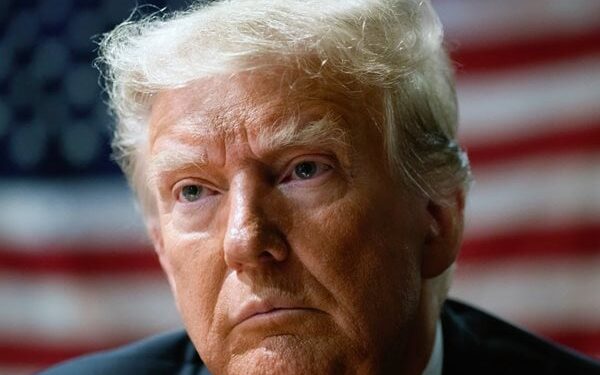Amid the hand-wringing of foreign-policy experts over former President Donald Trump’s reelection campaign, Alexander Gray, senior fellow at the American Foreign Policy Council, argued that a second Trump term would be good for America because it would strike fear into the nation’s adversaries again.
The experts, Gray wrote in a Tuesday opinion piece for The Wall Street Journal, “are predictably fretting over Donald Trump’s re-election campaign” and “fear that the former president threatens the alliances and partnerships that have sustained global peace since 1945.”
“Should Mr. Trump return to the White House, the thinking goes, he will be unconstrained by the guardrails that prevented him from torpedoing America’s alliances in his first term and will permanently damage both U.S. security and the international order,” Gray wrote.
There’s just one problem with that narrative, according to Gray: “The U.S. alliance system didn’t crumble during Mr. Trump’s first term.
“On the contrary, the Trump administration strengthened relations with partners in the Indo-Pacific, Central and Eastern Europe and the Mideast,” he wrote. “Anyone who believes that Mr. Trump was once bound by conventional wisdom but won’t be again — and will wreak havoc on the global order he ostensibly detests — hasn’t been paying attention.”
Gray then recalled what Trump inherited from the Obama administration on his first day in the White House: its “disastrous ‘red line’ in Syria, its ill-conceived Iranian nuclear deal, its failure to deter or respond adequately to Russia’s 2014 aggression against Ukraine.”
On top of that, the Obama administration’s “toleration of Chinese malign activity in the South and East China seas, and its promise of a ‘new model of great-power relations’ with Beijing had brought U.S. relations with allies and partners like Japan, Taiwan, Israel, the Gulf Arab states and much of Eastern Europe to a historic low point.”
Much of Trump’s time in office was spent “repairing those relationships” and finding innovative ways to build them up, he argued.
Many foreign-policy veterans were “appalled” by Trump’s methods, believing them to be destabilizing. But Gray pointed out that almost every U.S. administration “has publicly scolded North Atlantic Treaty Organization member countries for shirking their defense-spending commitments.”
“Mr. Trump did likewise — and, perhaps unlike his predecessors, was seen as willing to take decisive action to secure change,” Gray wrote. “Through public and private cajoling — also known as diplomacy — he secured a commitment from NATO members to beef up their contributions. From 2017 through 2021, nearly every signatory raised defense spending, contributing substantially to the alliance’s ability to respond to Russia’s invasion of Ukraine in 2022.”
Additionally, the Trump administration’s “goal of strengthening America’s standing in the world bore fruit, including the Abraham Accords between Israel and several Arab states, a significant upgrade to the Quad alliance among the U.S., India, Australia and Japan, stronger diplomatic relations with Taiwan thanks to unprecedented cabinet-level visits and record arms sales, and an unexpected deal between Serbia and Kosovo.”
“After three years of press adulation over America’s supposed return to the world stage under President [Joe] Biden,” Gray asked, what do Americans and the world have to show for it?
“So far, a catastrophic withdrawal from Afghanistan, the failure of American deterrence in Ukraine, an Iranian nuclear breakout inching ever closer, and an accelerating Chinese threat toward Taiwan,” he answered. America’s allies around the world have also “begun to chart their own course in the face of an uncertain U.S. trumpet.”
Trump’s presidency is being “willfully” misrepresented by the “global foreign-policy elite,” which is also “scare-mongering about a second” Trump presidency in an effort to sow “needless fear around the world,” Gray claimed.
“Should Mr. Trump return to the White House, there will doubtless be sighs of relief among officials in friendly capitals who remember his time in office,” he wrote. “It isn’t difficult to understand why: Mr. Trump’s language may make diplomats uncomfortable, but his actions strike fear among those who matter most to American security: our adversaries.”
Nicole Wells ✉
Nicole Wells, a Newsmax general assignment reporter covers news, politics, and culture. She is a National Newspaper Association award-winning journalist.
© 2024 Newsmax. All rights reserved.
https://www.newsmax.com/newsfront/donald-trump-alexander-gray-nato/2024/04/04/id/1159844






